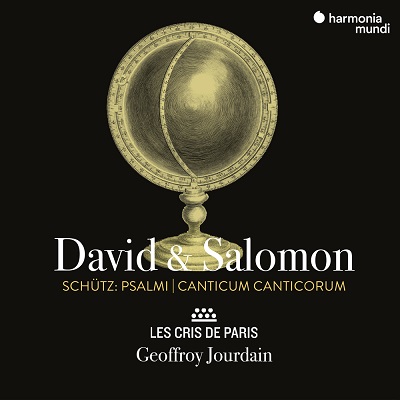This first foray into the music of Heinrich Schütz from Les Cris de Paris is an absolute winner, a superb addition to the composer’s discography of more than 100 recordings. It comprises sacred settings inspired by the Psalms of David and the Song of Solomon which the composer published over a ten-year period between 1619 and 1629 following two periods of study in Venice first under Giovanni Gabrieli then Claudio Monteverdi.
These are richly communicative performances, notable for their vivid colouring and rhythmic vitality which bely the age-old portrayal of Schütz as a severe figure whose music has been too often associated with a grave solemnity. This last attribute has been compounded by his Musikalische Exequien (a funeral work yet notable for its dancing rhythms) and the frequently overstated fact that Schütz lived through the horrors of the Thirty Years’ War (1618-1648) and lost his wife and two daughters within six years of his marriage. But the musical invention on display here, the sumptuous polychoral style, and the powerfully spiritual response to the texts (not least the striking word painting) all point to a composer who deserves a place among the immortals.

The CD compilation is book-ended by four psalm settings each revealing an Italianate splendour owing much to music conceived for St Mark’s Venice. Joie de vivre inhabits the opening Alleluja! Lobet den Herren (Psalm 150), notable for its alternation of solo forces and chorus where instrumental support (of up to 23 players) varies for each of the discrete vocal groups. I love the decorative cornett writing and the sheer weight of low wind sound accompanying the double choir tutti passages. Then there’s the nimble delivery in verse sections, chirruping recorders and sprightly violins catching the ear in a grateful passage where two basses extol the psaltery and the harp. Crowning this psalm is the final ‘Alleluia’ where tinkling guitar and harp sonorities find their place in the soundscape, all deftly pushed along by Goeffroy Jourdain’s well-judged tempi. Harmonia mundi’s engineers create an excellent balance, voices and instruments cleanly articulated whether in surging climaxes or individual flourishes cherished by one and all.
Even more extrovert is the ambitiously scored Danket dem Herren (Psalm 136) which concludes the disc and where brass and drums add a distinctive pageantry, a single trompette scorching the air to startling effect. Some occasional strenuous singing intrudes, but there’s no doubting the instrumental and vocal opulence within its more limited expressive range, and the influence of Gabrieli is evident. Elsewhere, there is the polished restraint of Die mit Tränen säen, where smaller vocal forces bring clarity to verses from Psalm 126 (They that sow in tearsshall reap in joy). Word-painting, rhythmic animation and lush suspensions mirror the text’s journey from darkness to light. By far the most evocative setting is An den Wassern zu Babel (Psalm 137). Its lamentation for continuo instruments and antiphonal choirs suddenly erupts for the destruction of Jerusalem, both choral groups battling it out in a fierce imitative episode followed by chains of suspensions for the calmer ‘Gloria’. There’s a passionate dynamism too in Warum toben die Heiden (Psalm 2), its emphatic vocal exchanges leavened by florid brass writing.
No less inspired are the composer’s chamber-like compositions (solo voices and continuo) found within Cantiones sacrae (1625) where a madrigalian intimacy informs both Ego dormio et cor meum vigilat and Vulnerasti cor meum filia charissima. Schütz ‘s response to the Song of Songs (or Song of Solomon), from which these texts derive, is permeated with an expressive ardour, here fully realised, exquisitely so in the latter by soprano and tenor soloists. Tenor and baritone voices, two cornetts and continuo bring much refinement to Anima mea liquefacta est, phrases admirably shaped with a natural feel for the music’s ebb and flow. If the ravages of the Thirty Years’ War had forced court musical establishments to slim down their musical resources, there is no reduction in the emotional impact of these works. It is interesting that the composer should turn so frequently to the Song of Songs considering its texts had no liturgical function, but which clearly provided a stimulus for his musical language as it increasingly absorbed Italian influences.
Among other works on this disc inspired by the Song of Songs is Ich beschwöre euch, ihr Töchterzu Jerusalem, belonging tothe genre of dialogue-style compositions popular in 17th-century Protestant Germany. Here, two solo groups represent the words of Shulamite (four sopranos) and the “Daughters of Jerusalem” (three low voices), combining for the ecstatic final verse. There’s a rapt quality too in the closing bars of Veni de Libano, veni, amica mea (notable for its walking bass part) where two fresh-voiced sopranos soar over strings and flutes in heaven-bound phrases evoke paradise gained – something Les Cris de Paris come tantalisingly close to reaching under Jourdain’s sure-footed direction.
David Truslove
Les Cris de Paris, Goeffroy Jourdain (director)
Heinrich Schütz: Psalmen Davids Op.2 – Alleluja! Lobet den Herren SWV 38, Die mit Tränen säen SWV 42, An den Wassern zu Babel SWV 37, Warum toben die Heiden SWV 23, Herr, unser Herrscher SWV 27, Danket dem Herren, denn er ist Freundlich SWV 45; Cantiones sacrae Op.4 – Ego dormio et cor meum vigilat SWV 63, Vulnerasti cor meum, filia charissima SWV 64; Symphonie sacrae Book 1 – Anima mea liquefacta est SWV 263, Adjuro vos filiæ Jerusalem SWV 264, O quam tu pulchra es, amica mea (prima parte) SWV 265, Veni de Libano, veni, amica mea (seconda parte) SWV 266; Ich beschwöre euch, ihr Töchterzu Jerusalem (Dialogus) SWV 339; Samuel Scheidt: Paduana Dolorosa a 4 SSWV 42.
Harmonia mundi HMM 905346 [73.52]
ABOVE: Geoffroy Jourdain (c) Samuel Berthet